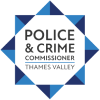Domestic Abuse Advice/Covid-19
Advice for victims of domestic abuse during the Coronavirus Pandemic
The government acknowledges that the order to stay at home can cause anxiety for those who are experiencing or feel at risk of domestic abuse. Domestic abuse is unacceptable in any situation, no matter what stresses you are under.
While the current advice is to stay at home during the Coronavirus Pandemic, the government has made it clear anyone who is at risk or, or experiencing domestic abuse, is still able to leave and seek refuge.
Anyone can be a victim of domestic abuse, regardless of gender, age, ethnicity, socio-economic status, sexuality or background. For anyone who feels they are at risk of abuse, there is help and support available to you. You can make a referral for support through Victims First by completing our online form at ‘Make a Referral’ from our home page
You can also talk directly to domestic abuse services. Contact details for the services in the Thames Valley are below along with the National Domestic Abuse Helpline which is open 24 hours a day, seven days a week.
Thames Valley Police are available 24/7 to provide help and support. In an emergency, people should always call 999. If you can’t speak, call 999 and then dial 55. This is called the Silent Solution, and the call taker will sensitively manage the police response. In a non-emergency, people can call 101 or make a report online on the Thames Valley Police's website

Ask for ANI
Ask for ANI (Action Needed Immediately) is a codeword scheme developed by the Home Office to allow those experiencing domestic abuse to signal they need emergency help through a local pharmacy.

The scheme has been developed in response to the coronavirus pandemic to help those who have felt isolated and more difficult to ask for help during lockdown.
Victims of domestic abuse are able to use the codeword ANI (pronounced Annie) in participating pharmacies (including all Boots stores and participating independent pharmacies) to let staff know that they require an emergency police response or help contacting a helpline or specialist support service.
Participating pharmacies will display posters in their window and around the pharmacy to let customers know that they can approach their staff to seek help. Any information shared will be treated confidentially.
When a victim uses the codeword or asks for help, the member of staff will ask the victim to accompany them to the consultation room. They will then check whether the victim is in danger and wants the police to be called. If so, the staff member will offer the use of a phone to dial 999 or make the call on the victim’s behalf.
If the victim is not in an emergency situation, the staff member will support the victim to contact a national domestic abuse helpline or local support service. They may also contact the police via 101.
You can find a full list of Thames Valley pharmacies involved in the programme on the Thames Valley Police website here
Safety Plan
If you are living with a perpetrator in self-isolation you may want to think about a safety plan. A safety plan is a way of helping you to protect yourself and your children. It helps you plan in advance for the possibility of future violence and abuse.
Thing you can do to help increase your safety include:
- Keep with you any important and emergency telephone numbers (for example, your local domestic abuse service, the police domestic violence unit; your GP and the Freephone 24 Hour National Domestic Abuse Helpline: 0808 2000 247). If you have a phone, save them on your phone as a different contact. If you don’t have a phone, know where your nearest phone is.
- Plan how you will make a call for support e.g. you could say there are no online shopping slots available so you need to go shopping, or you could make the call from the toilet of the shop if the perpetrator is there.
- Teach your children to call 999 in an emergency, and what they would need to say (for example, their full name, address and telephone number).
- As shops and restaurants/pubs are shut, plan for where you can run to or hide. Are there neighbours you could trust and where you could go in an emergency? If so, tell them what is going on, and ask them to call the police if they hear sounds of a violent attack.
- Have a code word or sign for if you are in danger. Set this up for family and friends to let them know by text / Facetime / skype / zoom. The code will need to alert them to contact the police if you are in danger and need to get out. Teach the code to age appropriate children.
- Pack an emergency bag for yourself and your children, and hide it somewhere safe for example, at a neighbour’s house.
- Be prepared to leave the house in an emergency.
Women's Aid has also developed safety and support advice for survivors and community members during the COVID-19 pandemic in partnership with 23 domestic abuse and VAWG (Violence Against Women and Girls) organisations. You can download the resources here
Government guidance on support for domestic abuse during the Covid-19 Pandemic can be found here

